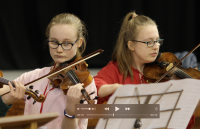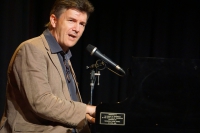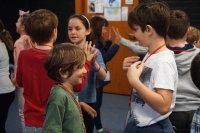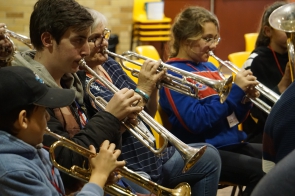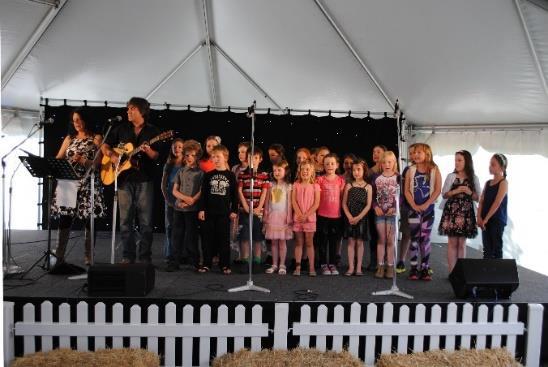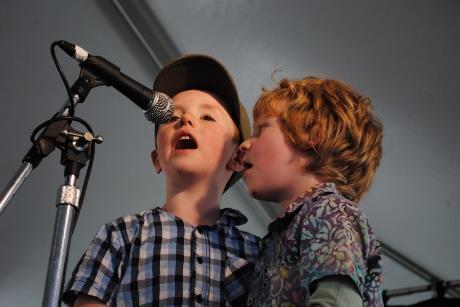Foundation for Rural & Regional Renewal (FRRR)
On Boonwurrung Country
The primarily agriculture-based Bass Coast community is a two-hour drive, south-east of Melbourne. It’s therefore perhaps not surprising that it’s one of the fastest growing areas in regional Victoria. Wonthaggi is the main centre, with a population of around 8,000 in the township and many more spread across neighbouring towns and hamlets. There is a significantly lower level of weekly income than the Victorian median and a lower proportion of school leavers (19%) participate in higher education compared to the state average (36%). Much of the employment is seasonal, part time or casual. This meant that COVID had a severe impact on the area, with many families falling through the gaps of the Government financial assistance packages.
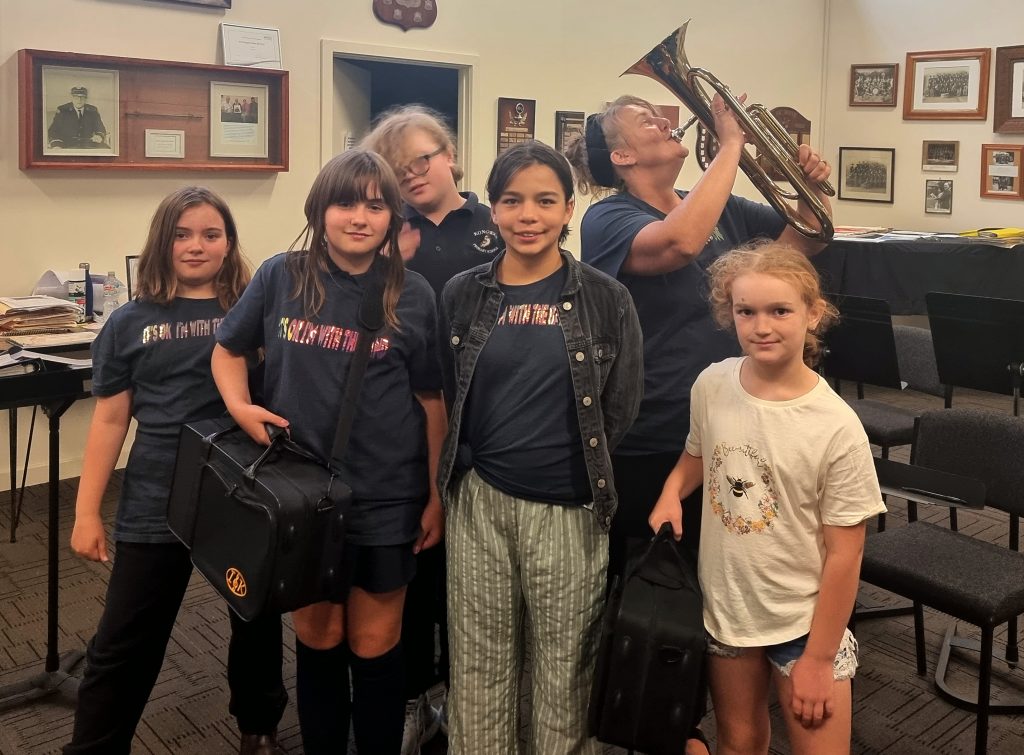
Established in 1910, Wonthaggi Citizens Band (WCB) is managed by a voluntary committee. Its vision is to develop and nurture musicians, enabling them to provide music for the benefit of the Bass Coast community.
With COVID having an impact in an already challenging socio-economic environment, the group wanted to give an affordable music education to young people. Their aim was to introduce them to the wonder and benefits of music and encourage their participation in the band by offering subsidised tuition on brass band instruments from a qualified music teacher. It also sought to strengthen connections by bringing participants together for rehearsals in a supportive environment.
There is much documentation on the educational, cognitive and physical benefits to be received from learning music on a brass instrument, particularly in improving numeracy and literacy skills. Research shows that children who take music lessons show different brain development and improved memory over the course of a year, compared to children who do not. Further, with the high focus on childhood obesity, participation in a marching brass band cannot be underestimated for improved physical health. It improves general fitness, flexibility and muscle strength through both breathing techniques and the physical activity of marching – giving an alternate physical activity to young people not interested in sport.
This project also responded to the Bass Coast Shire Youth Action Plan, which identified the lack of options for those not interested in sport and the lack of access to appropriate arts and culture.
The organisation successfully applied to FRRR, through the Gardiner Dairy Foundation Community Grants program for $5,000 to help them establish the program and cover the initial tuition fees subsidy.
As a result, 10 young people aged between 10 and 13 had their first introduction to brass band music. These participants received half-hour individual lessons in a variety of brass instruments and then came together to learn how to play together as a band. At the end of this period, eight young people remained engaged with Wonthaggi Citizens Band and have joined the Youth Band to further their music. These young people have formed a strong social connection with one another, which assisted them during the lockdown periods when they kept in touch online. Feedback from both young people and their parents have acknowledged the benefit young people received from their participation when many others were struggling in coping through the impacts of COVID.
This project has also created social connections between generations, as the three bands of Wonthaggi Citizens Band intermingle and participate in joint performances. The music learnings by the young people have been “outstanding”, as has their participation levels. This was in no small way due to the quality of the tutor and her ability to engage with the young people, and with the senior band members who volunteered their time to assist and mentor.
“We’re excited that this project is set to have a lasting legacy, with the band set to undertake a two-year project to work with 20 ‘at risk’ students at a local primary school, using brass band music to re-engage them,” said Sandra Mousey, a volunteer on the project.
“The community is more engaged and participative, students are more engaged in learning and there are generally stronger levels of resilience in the community,” she wrote.
For more inspiring stories like this, head to our FY 2021/22 Annual Review.
Unlike most other youth music programs, CRASHENDO! Bairnsdale is not only about the tunes. Modelled after Venezuela’s National System of Youth and Children’s Orchestras and Choirs El Sistema Global, CRASHENDO! uses music education as a vehicle to help children develop their self-esteem, resilience, and social skills.
To support the purchase of new instruments and to help cover tuition fees, the CRASHENDO! team successfully applied to FRRR’s Strengthening Rural Communities program, receiving a $10,000 grant funded by The William Buckland Foundation (managed by Equity Trustees).
They sent us a detailed plan outlining how they planned to use the funds over the course of two years, and how excited they were to get on with their music classes, events, and other activities.
What they couldn’t have known, however, was that the years that followed – 2019-2020 – would be some of the most challenging years their community had ever experienced.
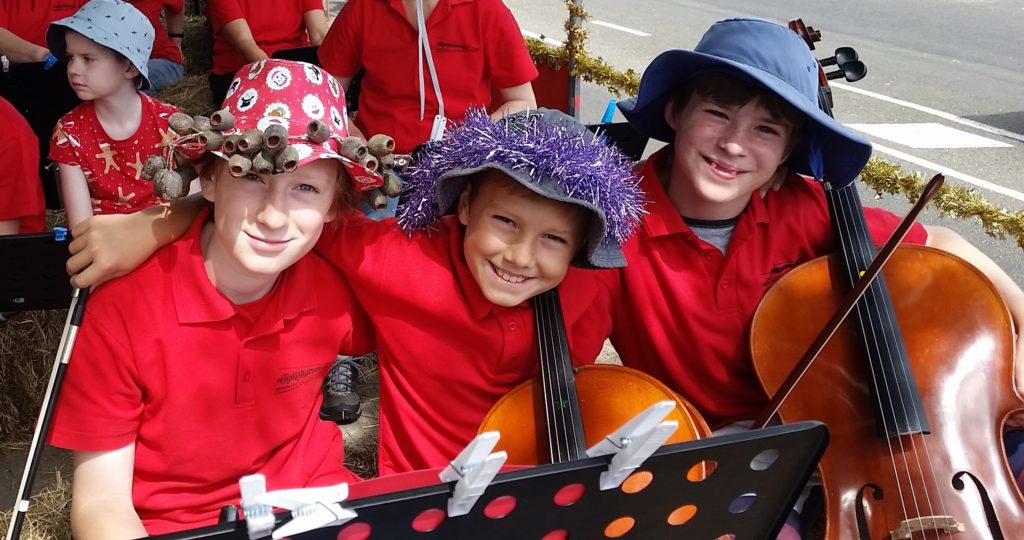
The CRASHENDO! program, which supports around 120 children in Bairnsdale and surrounds, had a great start to the year in 2019, with in-schools tuition, pre-orchestral, orchestra and early years programs in full swing. They also hosted several special events such as the Latrobe Orchestra Workshop and the Christmas Street Parade, both of which brought much joy to the community.
But as Christmas drew closer, so did the devastating bushfires that were already tearing through parts of NSW and VIC. And when the semester was set to begin again in the new year, the CRASHENDO! students had no school to return to.
The facilities, including all their instruments, were destroyed in the fires. Several families in the community had also lost their homes.
But despite these unimaginable challenges, children and tutors alike demonstrated once again the resilience and fighting community spirit we so often see in rural and regional Australia. The classes were moved to another school, and the children found some relief in returning to something familiar and normal – their music practice.
With support from their wonderful and engaging tutors, and by working together in groups, the children continued to develop both their musical skills and interpersonal skills.
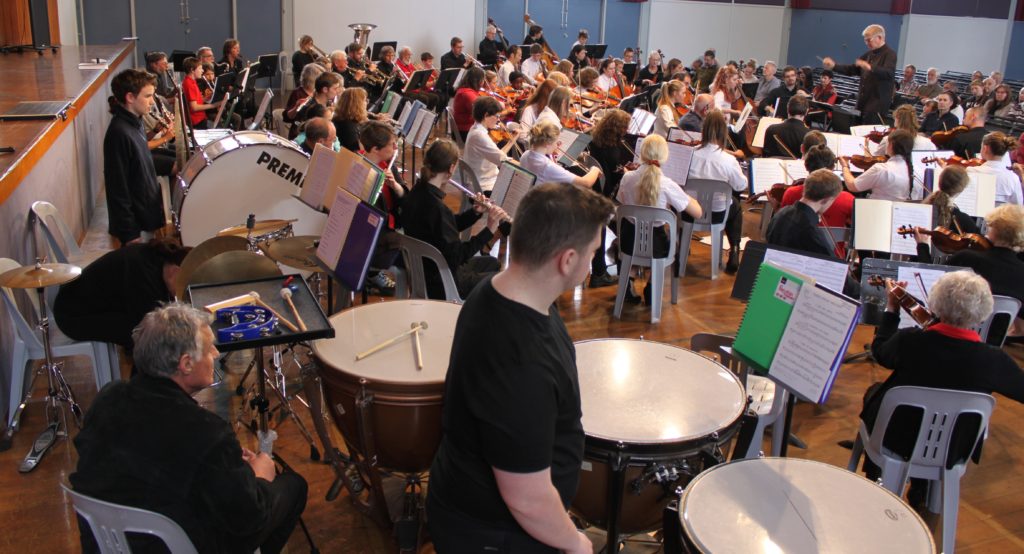
But as we all know too well, 2020 brought with it its own set of challenges.
Soon after the COVID-19 virus reached Australian shores, life for the Bairnsdale community was once again turned upside-down. The community went through two remote learning periods (April – June and July – September), which meant all programs had to be moved online.
During this those unusual times, CRASHENDO! Bairnsdale Youth(ful) Orchestra (CBYO) reduced their sessions, halted expansion plans, and cancelled concerts and community performances.
The future was looking uncertain and bleak. But the CRASHENDO! team – both children and staff – were not about to give up that easily. They already knew the strength they had within them, especially when working together, so they kept their heads high, their Zoom cameras on and their smiles BIG – as they found new and engaging ways of delivering their programs.
Instead of having concerts, they produced videos. Instead of cancelling all Special Events, they scaled down the delivery time and incorporated video compilations. The creativity was flowing and proved to be a great learning experience across the board.
Watch a clip from the adorable video performance here.
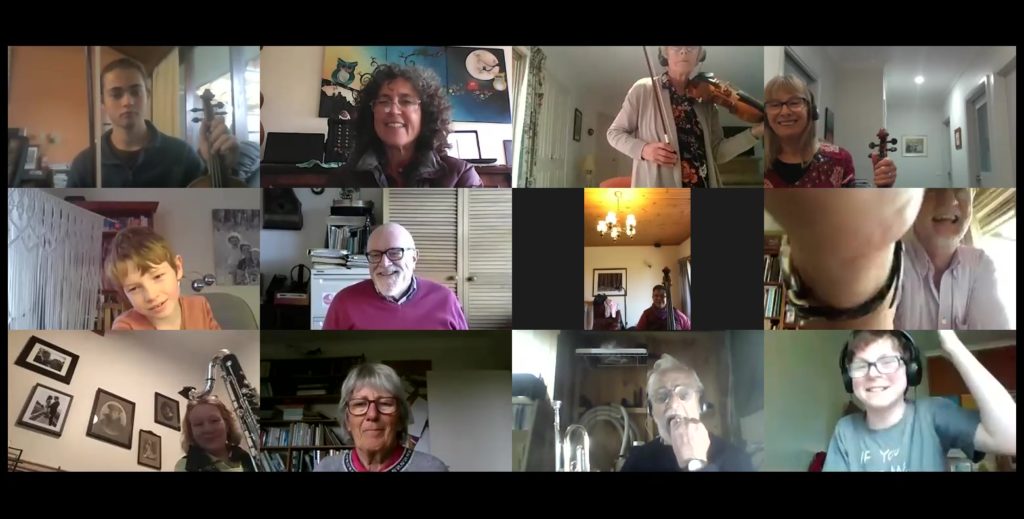
“Although extremely challenging we have been extremely excited about the opportunity to learn new ways of delivering programs, administration and promotion,” Hilary Rigg, Crashendo! Bairnsdale Coordinator said.
She explained that while the number of participants decreased during online delivery, it also allowed them to widen the scope of musical styles and instruments on offer in the program, as well as the geographic area in which participants lived (across wider Gippsland and Melbourne). As tutors could dial in from anywhere, CRASHENDO! also grew their pool of highly skilled tutors, from areas including Melbourne, Geelong and even interstate.
“We have widened networks, forged new or deeper collaborations with other local musical groups and personnel, and kept musicians connected and playing. Hence, most importantly contributing to the well-being of our community!”
Hilary Rigg, Crashendo! Bairnsdale Coordinator
Merrigum Primary School is a rural Victorian primary school with a small number of staff and students. The school is committed to building school capacity to provide students with educational opportunities through enhanced, personalised learning.
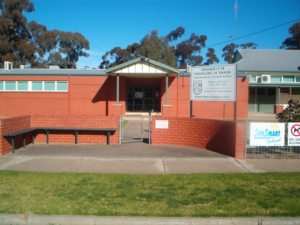
Many Merrigum Primary Students come from diverse backgrounds and some require additional learning support – something that the school community strives to provide them with. One of the areas where the school wanted to offer more support was music activities and education for the pupils.
In partnership with Merrigum Primary School, The Song Room, an organisation that delivers integrated music and art lessons in school delivered a six-month music program to students from Foundation to Year 6, working alongside their classroom teachers. The program was possible with thanks to a $7,500 REAPing Rewards grant.
Students greatly enjoyed the program and looked forward to their music lessons. Caitlyn Trotter, who led the program for students, told FRRR that the children responded well to all the activities.
“By the end of the lesson, they understood the basic (musical) terms. The children enjoyed being able to work together as a class and loved that they got to play an instrument as part of a song. This was always thoroughly enjoyed.”
This was reflected in the feedback from teachers, Belinda and Judi who reported that “The sessions were very well planned and built sequentially week after week to offer students the opportunity to develop skills at a targeted pace. The students had a lot of fun, and even some of the more reluctant musos were looking forward to class by the end of it.”
As part of the program, The Song Room also facilitated professional development lessons for the teachers, so that the music program could continue well beyond the formal end of The Song Room’s time at the school. Teachers were given lessons plans, games and instructions on how to facilitate music classes in a way that supports the current curriculum. Merrigum Primary School now also has ongoing access to more than 1,000 hours of online video resources from The Song Room to assist with planning and developing arts curriculum for students in the future.
When a popular city-based summer school music program made plans to bring the beat to the bush and put on a show alongside it, the whole community of Tenterfield NSW let the rhythm takeover.
Recently ravaged by drought and fires, the small town was experiencing some hard times. Charitable organisation Hartbeat of the Bush teamed up with the Cuskelly College of Music’s Winter Music School in a bid to provide Tenterfield and the surrounding communities with a brief respite from it all – the result was a week long ‘Beat of the Bush’ festival during the July 2019 holidays.
Dr James Cuskelly has run a Summer School music program in Brisbane for years, but it was his long-held dream to bring the music back to the bush, to his roots. Despite the evidence that incorporating music in a child’s education shows life changing benefits, such as improving literacy, numeracy, confidence, behaviour and wellbeing, 63 percent of primary schools in Australia offer no classroom music. In regional and remote schools, there is limited or no musical and arts based education, and opportunities for children to actively participate as performers and artists, under the mentorship of professionals and in front of an audience, is rare and for some non-existent.
Hartbeat of the Bush supports arts, music and cultural development programs in regional and remote communities. This initiative was designed as a whole of community project, to enable participants to socialise with others from across and beyond their region. In total, around 160 participants attended the Winter School, travelling from Brisbane, the Gold Coast, Toowoomba, Ashford, Texas and Newcastle and lots of other little places in between.
The program kicked off with the Big Chilly Sing, a day-long singing and song-writing workshop that gave locals a chance to converge and get the toes tapping. This was followed by a range of courses and concerts for students of all ages delivered by more than 50 teachers, many of whom are internationally-acclaimed.
A range of concerts were also put on by the Winter School music educators themselves, which were attended by 220 people each night. Locals and visitors alike were treated to a folk concert, jazz performances, a chamber music concert, an opera night, a piano concert and of course, the final night culminated in one of the biggest concerts Tenterfield has ever seen. The finale was a rendition of the legendary Peter Allen song Tenterfield Saddler, performed by all of the Winter School attendees, and arranged by Pete Churchill, who led the Jazz studies program.
Musical experiences like this help children develop social skills and build confidence. Children from all over the region who had never met one another, played an instrument nor sung in a choir before this program amazed their family members with the talent and skills they had learnt in just five days. Many of these children are still in contact with each other and cannot wait for the next event.
What’s more, the economic benefits for the town were significant, with cafes, restaurants and retail outlets benefitting from a lot of foot traffic at a time when the drought impact was being deeply felt. A large number of local community groups were involved in some way, from making lunches and morning teas to providing venues for the concerts.
Hartbeat of the Bush President Ms Helen McCosker said it was a whole of community effort.
“The whole community was abuzz – even though we had had fires, drought and could no longer drink the town’s water, we had provided the businesses with a little sense of what was normal, something to look forward to and grow for our little country town.”
The $20,000 grant received by Hartbeat of the Bush was funded by the Australian Government through FRRR’s Tackling Tough Times Together program. This covered the costs of running free daily buses within a 100 km radius for commuters from Warwick, Bonshaw, Glen Innes and Tabulum, as well as accommodation at the local Tenterfield Motor Inn for tutors (both overseas and those from Brisbane) and volunteers.
In the many years it takes to rebuild a region following a disaster like the 2009 Victorian bushfires, success in driving tourism back to the area can be make or break. It takes a concerted effort from a cohesive community to start seeing positive growth again.
In the Kinglake Ranges, the Foggy Mountain Bluegrass Festival, held for the second time in 2015, achieved both of these important factors of recovery – driving community engagement while supporting wider economic development in a unique and exciting way.
The three day festival held last October (16th – 18th) attracted 1,500 attendees, 70% of which were visitors to the region. It included a Bush dance, music workshops, Bluegrass concerts, local produce, local talent, street performers, community concerts and a beard competition to support the Charity White Ribbon to raise awareness and funds to help stop violence again women. It brought local musicians back out in the open and connected a huge range of groups in the area, from the Kinglake CFA and Police to the Mountain Pickers Association of Victoria and the Australian Bluegrass and Old Timey Music Association. Many local food and accommodation businesses were booked out or sold out of products.
President of Foggy Mountain Inc, Brad Quilliam, said, “Overall we were extremely buoyed by the positive feedback from all involved and the festival achieving so many of its goals. The micro businesses in our area had rave reviews from all visitors which enhanced their confidence.”
Funding support came from a variety of sources – from the Rotary Club of Kinglake Ranges, CERT, CFA, SES, Kinglake Neighbourhood House, Kinglake Foundation, and Kinglake Lions, with in-kind support from local organisations and businesses, and an estimated $6000 of volunteer labour – vital to the festival’s smooth operation.
Children given a voice through song
Foggy Mountain Inc applied to FRRR’s Grants for Resilience and Wellness program (GR&W) in order to run a special part of the music festival program – the song-writing program for local primary schools, which would culminate in 100 students performing their songs at the Sunday Community Concert at the Foggy Mountain Bluegrass Festival (with free entry all day to ensure the whole community could participate.)
GR&W granted $4,850, funded by the Victorian Bushfire Appeal Fund, to support workshops for six primary schools in the region (Kinglake East, Kinglake West, Middle Kinglake, Strathewan, Toolangi and Flowerdale Primary School) as well as a sound engineer to record the children’s songs and stage for their performance, as well as chairs and an MC for the Community Concert. The workshops gave their students the opportunity to learn song writing skills and were facilitated by the acclaimed Carter and Carter.
“The workshops give the children a voice through song and in 2014 the children wrote about what they had lost and now what they have gained” Mr Quilliam reported.
Mr Quilliam said the students were the highlight of the day!
“It was a perfect platform to encourage participation, give self-confidence and show the work that the students had done in the song writing workshops leading up to the festival. The children were so excited to be performing to a capacity crowd in the main marquee.”
The community day also included workshops to learn new musical skills, benefitting up and coming musicians of all ages, and a Gospel Concert. Organisers are already talking about running a program for youth in production and video to expand on the value the festival can give to the area’s young people.
“This part of the program gives the locals a sense of pride and optimism,” Mr Quilliam said.

